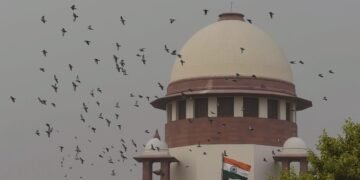Amid the ongoing second leg of the Parliament budget session, leaders of several opposition parties, on March 15, kicked off a protest march to the Enforcement Directorate’s office and submitted a complaint to the probe agency on the Adani issue. The protest march began from Parliament House wherein MPs from several opposition parties took part in it. But dampening the united opposition probability, the Trinamool Congress (TMC) gave the Opposition protest on the Adani issue a miss. The latest reaction by the TMC widened the rift between TMC and Congress which is certainly a setback for those who are hoping to form a united opposition to fight the mighty BJP.
The TMC leadership is upset over the comments of Adhir Ranjan Chowdhury, the leader of the Congress in Lok Sabha, on TMC chief and West Bengal Chief Minister Mamata Banerjee. On March 15, the TMC did not sign a joint opposition letter sent to the Director of Enforcement Directorate, S K Mishra, urging the probe agency to initiate an investigation into the Adani Group over allegations of corrupt practices, including money laundering through shell companies. It also did not participate in the opposition’s march to the ED office. “The Congress cannot take us for granted. On one hand its senior leader is alleging that there is a Mamata-Modi-Adani link, on the other it is expecting us to stand with them. The person who made the remarks is the sitting leader of the party in the House,” the TMC said.
While the TMC did not name the Congress leader, Chowdhury had made statements against Banerjee during the recent by-election in Sagardighi in West Bengal where the Congress won, handing out a shock defeat to the ruling party. The TMC is aware of the strain that the differences of opinion between the two largest opposition parties are putting on the opposition unity and the negative optics it has created. However, TMC is in touch with other non-Congress political parties and has kept other like-minded parties in the loop. The party has reached out to most opposition parties like AAP, CPI-M, Shiv Sena and southern parties, informing them of the decision to not be a signatory to the letter to the ED and not be part of the protest march.
The TMC also said that it has also conveyed its stand to Congress and the need to “restrain” Chowdhury. Even within the Congress, except for the leaders from West Bengal, those from other parts of the country are uneasy with Chowdhury’s recent remarks. At an election rally in Shillong in February, Congress leader Rahul Gandhi drew an angry response from TMC leaders such as Abhishek Banerjee and Derek O’Brien hitting out at Rahul for alleging that TMC is helping BJP indirectly. This also shows that Congress is not ready yet for opposition unity. Now the Congress has to decide if it is going to be a like-minded party and work with its rivals or not. Such rifts in the opposition ranks will have an impact on opposition unity ahead of next year’s parliamentary elections.

























